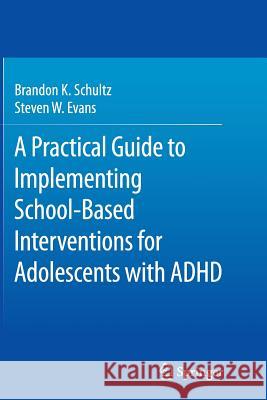A Practical Guide to Implementing School-Based Interventions for Adolescents with ADHD » książka
A Practical Guide to Implementing School-Based Interventions for Adolescents with ADHD
ISBN-13: 9781493939664 / Angielski / Miękka / 2016 / 208 str.
Research on the academic and social impairments related to disruptive behavior disorders, such as Attention-Deficit/Hyperactivity Disorder (ADHD) and Oppositional Defiant Disorder (ODD), suggests that youth with these disorders are at unusually high risk for school failure, school dropout, significant behavior problems, social rejection, and alcohol/substance abuse and dependence when compared to their peers. Clearly, effective interventions for this population are essential. However, research also suggests that due in part to deficits in executive functioning (e.g., memory, organization, planning), youth with disruptive behavior disorders are unlikely to benefit from interventions drawing strictly from cognitive or insight-based therapies. Therefore, the literature regarding counseling and therapy for adolescents seems to divide along two general lines: 1) a rich and growing counseling literature on internalizing disorders (e.g., CBT for social anxiety) and transition planning (e.g., college and career counseling), and 2) an equivocal counseling literature on externalizing disorders, where theory, research, and practice are rarely integrated. The proposed book bridges the gaps in the literature by integrating research and practice specific to the difficulties experienced by adolescents with disruptive behavior disorders. Much of our discussion will be based on our research of the Challenging Horizons Program and the High School Treatment Development Project conducted at James Madison University. During the course of these studies, graduate and undergraduate students have been trained to build alliances with adolescents, their teachers, and their families for the purpose of implementing evidence-based interventions. Counseling Adolescents with Disruptive Behavior Disorders describes this process in detail--drawing directly from the research and the relevant literature--with a focus on how this research can inform practice. This therapeutic approach is best described as "solution-focused" because it uses a trans-theoretical model, similar to that advocated by Steve de Shazer, John J. Murphy, and others. Counseling Adolescents with Disruptive Behavior Disorders builds on this tradition by describing how these concepts and techniques can be applied to youth with disruptive behaviors, while providing the reader with specific intervention ideas, troubleshooting strategies, and research findings from these studies and others.











